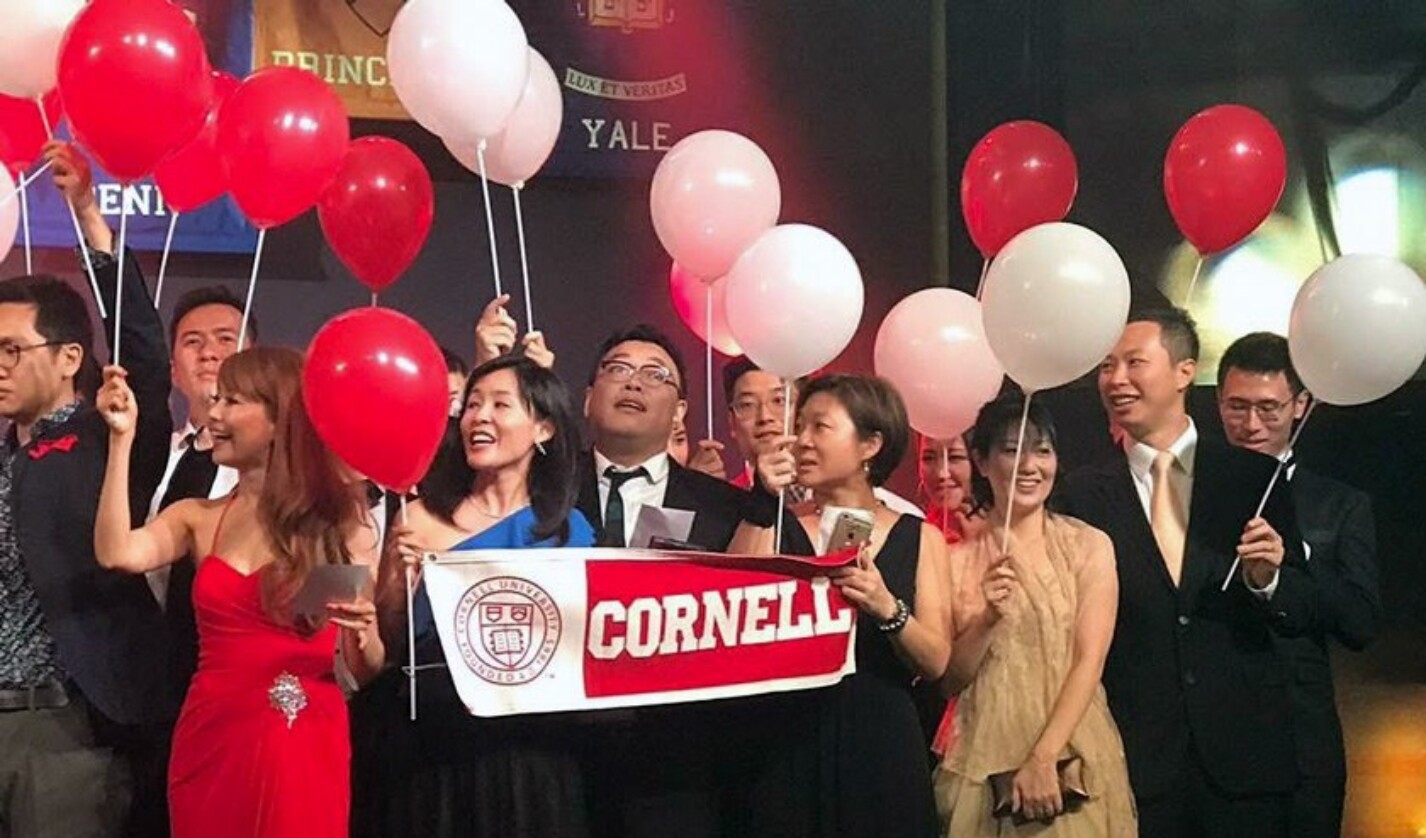Were it not for a teachers’ strike that happened decades before she was born, Connecticut native Katherine (Katie) DeRose ’26 might not have thought about applying to Cornell.
During her junior year of high school, Katie did a capstone research project on the Bridgeport teachers’ protest of 1978. Teachers there went on strike to protest what they considered to be unfair contract conditions. During the strike, which lasted 19 days, 274 teachers were jailed. The harsh treatment they received attracted national attention, and, in the aftermath of the strike, Connecticut passed a binding arbitration law requiring a neutral third party to settle labor disputes.
“I was able to make contact with several of the teachers who had been jailed,” Katie says. “They were all super passionate about it. One teacher who was in her 80s told me, ‘If I had to do it again, I would.’ She said this was the biggest impact she had ever had, because it changed the law in Connecticut about bargaining.”
This research project sparked Katie’s interest in workers, organized labor, and the future of work. When she read about Cornell’s School of Industrial and Labor Relations, she felt she would be a good fit.
I saw that view, and I knew I had to go here. I felt like Cornell is where I was meant to be.
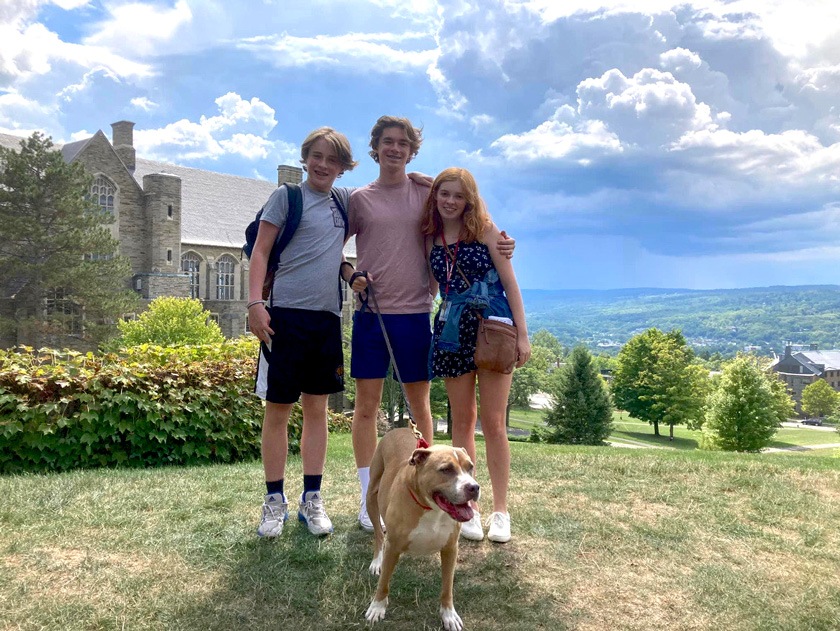
The next year, she and her mom visited Cornell. But their first stop wasn’t campus. It was the Cornell boathouse. Katie had been coxing (serving as coxswain) for Saugatuck Rowing Club’s men’s and women’s crew for the past few years, and she wanted to continue the sport in college.
On the campus map the rowing coaches gave her, Katie noticed a spot labeled ‘The View,’ which marked the terrace overlooking Libe Slope. She recalls walking past the ILR School and thinking to herself, “this is where I can study.” But the view from the Slope was the clincher.
“Before that, I had visited a lot of schools. On the tours everyone always said, ‘Oh, I knew the minute I stepped foot on campus that this is where I wanted to be.’ But I had not felt that before, and I didn’t think I was going to feel it,” Katie says.
Making a good financial choice
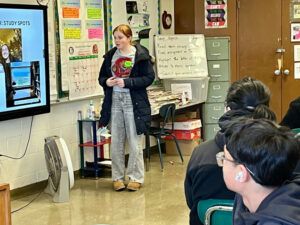
Katie was accepted to Cornell in October 2021 as an early decision applicant. But she’d have to wait a little longer for her financial aid offer, because the university sends these offers to accepted students a few months after early decision. When the aid package came, she and her family were amazed at how generous it was.
“I think my mom was shocked by how much aid Cornell offered me,” Katie recalls. “It made it possible for me to attend. And, it was something that I could afford to do—through working and paying tuition on my own—without really needing support from my parents. This is what I’ve been doing ever since I came to Cornell.”
In addition to Cornell grant aid, Katie receives the Shayegani Bruno Cornell Promise Scholarship, along with two ILR-specific scholarships—the Arcangela and John Balest Scholarship and the Professor George Brooks Scholarship.
Improving conditions for workers along the supply chain
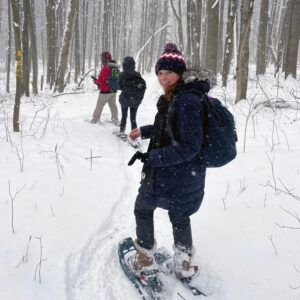
Now in her junior year at the ILR School, Katie has conducted comparative research on how different labor practices impact workers.
She has a particular interest in employment policies around women’s health. She’s currently working with Professor Vanessa Bohns, to study how asking for menstrual accommodations affects both an employer’s decision and their view of the employee.
“There are significant gaps in the literature,” Katie says. “I’m hoping that through studying this, I’ll eventually be able to better understand how menstrual health issues impact work and supply chain workers, building on the World Health Organization’s efforts to improve menstrual health.”
This summer, she’ll be focused on a very different project. Katie is excited to work as a sustainable sourcing intern with the luxury jeweler Tiffany & Co. She’ll be tracing the complex supply chains of gems like diamonds. It’s the type of work, she says, that combines her passion for helping people with her analytical skills.
“The diamond industry, especially, is very difficult to trace—down to where a particular diamond was sourced. Still, we want companies to be caring for the people along the supply chain, even if they’re not directly employing them,” Katie explains.
Earning the nickname ‘Skipper’
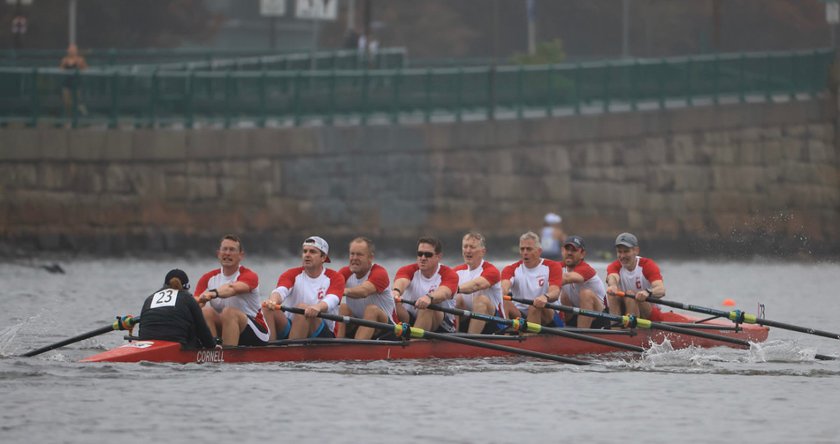
Alongside her academic work, Katie’s been able to keep rowing and coaching. She coaches middle and high school crew at the Cascadilla Boat Club and serves as a coxswain for Cornell alumni rowing in the annual Head of the Charles regatta in Boston. And, she races nationally with adult crews from Saugatuck Rowing Club in Connecticut. It’s a big time commitment—at least five days a week for 2-3 hours. But she loves being on the water, and she loves helping members of a team learn to work together in synch.
When she was 16, coxing for the Saugatuck Rowing Club, a retired Navy pilot on the crew began calling her ‘Skipper.’ “At first, I thought it was because he didn’t know my name,” Katie says. “But he explained to me that it’s a sign of respect, because I had command over all these 60-year-old men.”
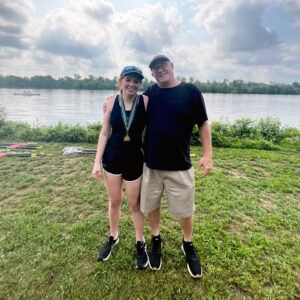
Coxswains are coaches on the water. They keep the crew united and focused on crossing the finish line safely and as fast as possible.
“It’s basically a public speaking role, with a lot of critical decision making. You have to analyze—quickly—whether it’s too risky to go close to another boat,” she explains. “This has definitely helped me build confidence and understand how to communicate to different people. When I’m talking to a 70-year-old woman or to a 14-year-old boy, that’s very different.” Katie sees the ways it’s trained her to do well in college and beyond.
She’s not certain what that “beyond” will be yet, but she hopes to keep combining her desire to be on the water and her desire to work for the greater good. She’s considering pursuing an advanced degree—maybe at a university where she can cox while she earns her PhD.

